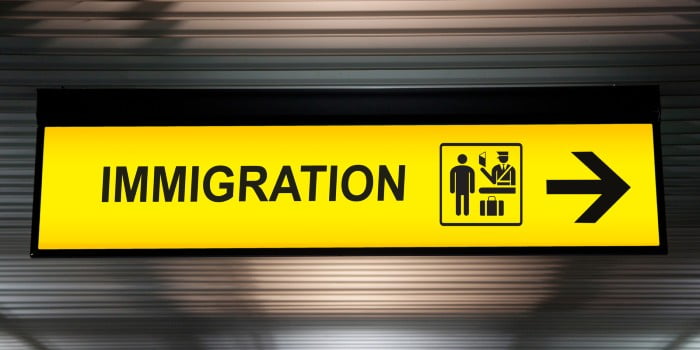12 December 2023 – Last week the new Home Secretary has unveiled new immigration plans to curb legal immigration to the UK. The new rules will be another blow to small UK businesses struggling with an ongoing skills shortage.
Labour shortages and a skills gap has plagued small businesses in the UK for a while, stopping many from growing and reaching their potential. Overseas workers provided the answer for many small and medium-sized enterprises (SMEs).
However, under the new immigration plans, the threshold for the minimum salary for skilled workers will be raised by almost 50%. This will have a huge impact on many small businesses, as it will lock them out of getting the skilled workers from overseas they need.
After a tough year for small businesses, the new immigration rules that are scheduled to come in next year will be another blow for many small businesses.
New Immigration Plans Prompted By Latest Immigration Figures
After the Office for National Statistics (ONS) released its latest immigration figures, it was revealed that net migration in the year 2022 reached 745,000. This record-breaking number has sent shock waves through the Convservative Party, prompting the new Home Secretary, James Cleverly, to draw up new plans to restrict legal immigration.
Mr Clevery announced his new policy containing a five-point plan, saying it would cut migration by 300,000. The biggest headline is the increased minimum salary threshold. Currently, a skilled worker has to earn £26,200 to be eligible for a work visa.
From spring 2024, this threshold will rise to £38,700, almost double the current amount. This sharp rise will mean that a wide host of roles will become ineligible for a working visa.
Under the current minimum salary threshold, only one sector’s median wage doesn’t meet the threshold, the hospitality sector. But under the new plan, 13 more sectors will slip below the qualifying median salary threshold, including education, construction, manufacturing and administrative and support sectors.
This new qualifying salary amount will be a blow to many small businesses, who won’t be able to pay the required wage to sponsor a worker from overseas. This means many small businesses are stuck. They can’t find workers with the right skills in the UK, but can’t afford to recruit from overseas.
It’s still unclear which threshold will apply for existing working visa holders who have to renew their visa. This uncertainty will cause a lot of stress to employees and employers alike, who might lose part of their workforce, unless they can increase their wages by almost 50%.
There is also a likelihood that fees and charges will go up, making it even more expensive for employers to hire talent from overseas they can’t find here in the UK.
Changes To Shortage Occupation List
The new immigration plans will also bring in changes to the Shortage Occupation List (SOL). It may even disappear completely, as Mr Cleverly asked the Migration Advisory Committe (MAC) to review if it should be abolished.
The list holds a number of jobs where there is an acute shortage in the domestic labour market to make it easier to recruit skilled workers to these roles from abroad, by lowering the minimum salary for these roles by 20%.
However, the 20% salary discount for roles on the SOL will be removed. The plans will replace the discount with a general threshold discount, but it is not clear what this will look like.
This means that even roles where there is a domestic shortage, won’t be easy to recruit from abroad any more. Especially the hospitality sector will be impacted by this, as the removal of the discount will make it impossible for many businesses in this sector to recruit from abroad.
Our Opinion
What baffles us about these new immigration plans is the complete lack of understanding of the impact they will have on small businesses. It seems like the government thinks that UK businesses recruit from abroad because they want to.
However, in our opinion most small businesses would love to recruit domestically. It’s cheaper, less time-consuming and less complicated. But if they can’t find the skills they need to grow their business, they only have two options: hire from overseas or don’t grow.
These new plans have now made one option almost impossible for many small businesses. The new proposed salary thresholds are just too high for many SMEs, no matter how much they need the staff.
This leaves them with one option: don’t grow their business. This will not help the UK economy, as it is reliant on the millions of small businesses to grow and thrive.
The new plans make one thing very clear: hiring talent from abroad is only for big corporations who can afford the fees and the higher salary threshold. This government has failed to address the skills gap that has plagued small businesses for years.
And now, they are throwing them under the bus by making hiring the needed talent from abroad unattainable for many.






